Increasing Employment for Persons with Disabilities—A Project in Sri Lanka Shows Steady Results
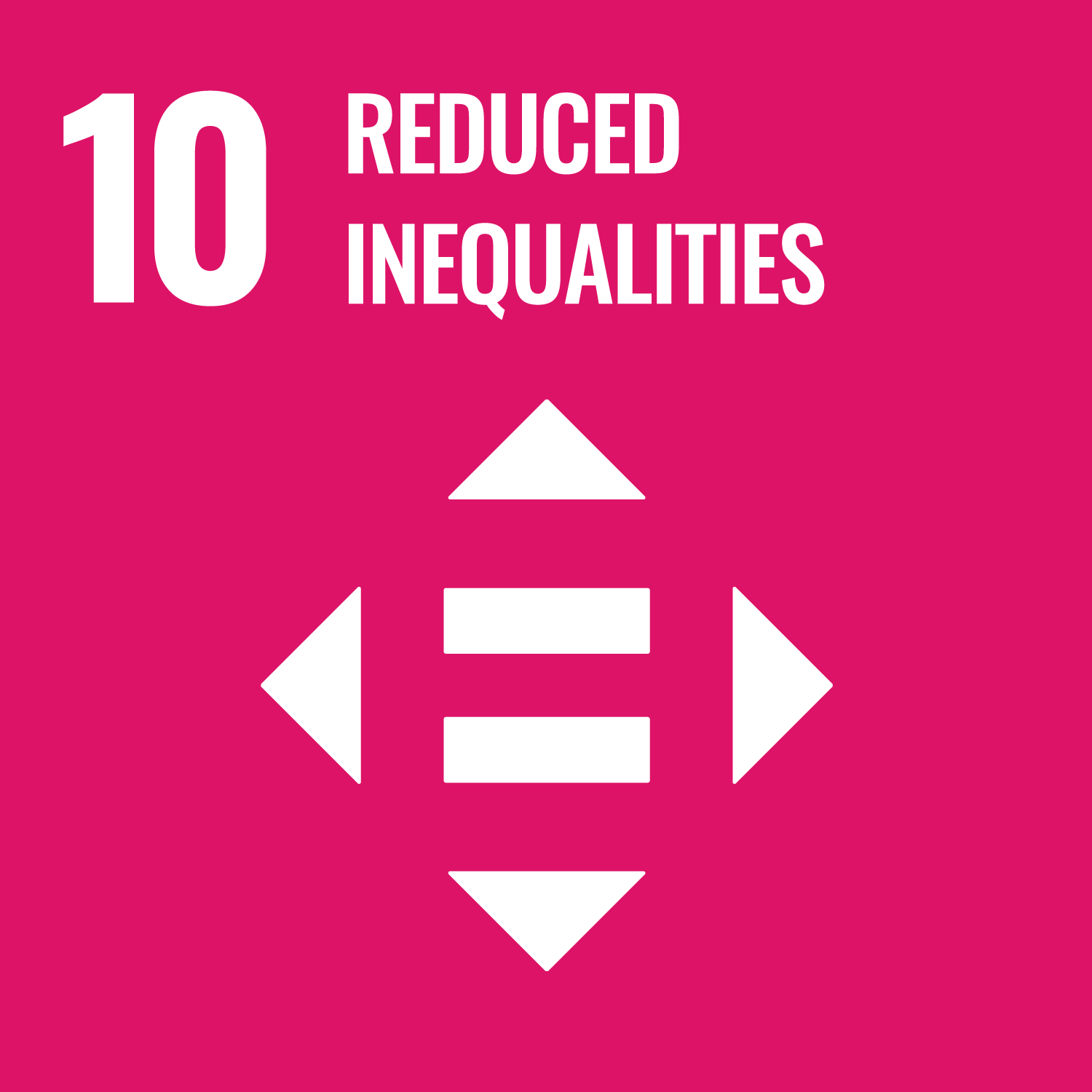
2023.12.01
Bias and discrimination against persons with disabilities have been deeply rooted in Sri Lanka, but the attitudes toward their employment are gradually changing. One catalyst was the “Project for Promoting Employment Support of Persons with Disabilities in Sri Lanka,” started by JICA in 2021. December 3 is designated as the International Day of Persons with Disabilities by the United Nations; it is an opportunity to consider the significance of JICA’s project as well as the social issues concerning employment of persons with disabilities.
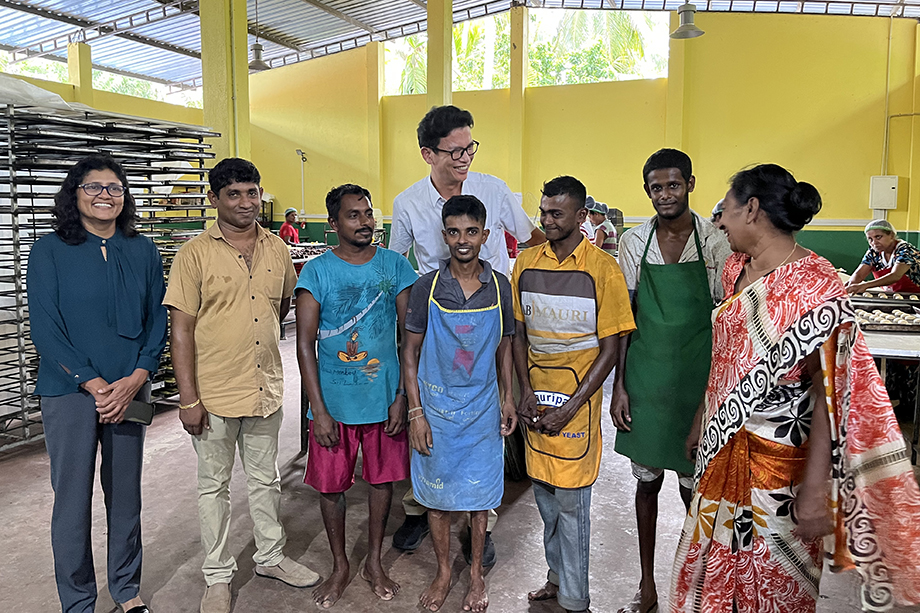
Persons with disabilities employed at a bakery through the JICA project, here seen with the company owner and government officials. JICA expert Shimizu Takashi is standing at the back.
The “Social Model of Disability” is a rights-based approach widely recognized in the world. It proposes that “disability” does not lie in the individual, but in society, and that it is society’s responsibility to eliminate this disability. Many persons with disabilities, however, still have limited opportunities to participate in society, so it is necessary to understand the importance of protecting the rights of those with disabilities and their need to participate in society.
The ideas of diversity and inclusion are spreading among the international community, in which the diversity of people and the need for everyone to be given opportunities to play an active role in society according to their own individuality and abilities are recognized. While efforts to employ persons with disabilities are progressing, the reality is that many countries still do not have these foundations in place. Sri Lanka is an example.
In Sri Lanka, there have been deeply rooted bias and discrimination against persons with disabilities. They are seen as individuals who should be protected at home. The social welfare system for these people is inadequate, and the country lacks a comprehensive employment support system for them. Employment has not even been considered as an option, and even private companies have made little effort to employ persons with disabilities.
At the request of the Sri Lankan government, which felt the need to promote the social participation of persons with disabilities, JICA began the above-mentioned technical cooperation project to build an employment support system for those with disabilities.
Shimizu Takashi, who has been involved in this project as a JICA expert, reflected on the beginnings of the project in November 2021.
“At the time, many people involved in the project, including government officials, had prejudices against persons with disabilities,” Shimizu said. “I heard many comments like, ‘Persons with disabilities have no interest in formal employment and just want to pursue self-employment, making handicrafts or something similar’; and ‘Such persons aren’t capable of working without special vocational training.’ According to Shimizu, there was no system through which persons with disabilities who were willing to work could have their voices heard, and there was a lack of communication between those job seekers and the government.
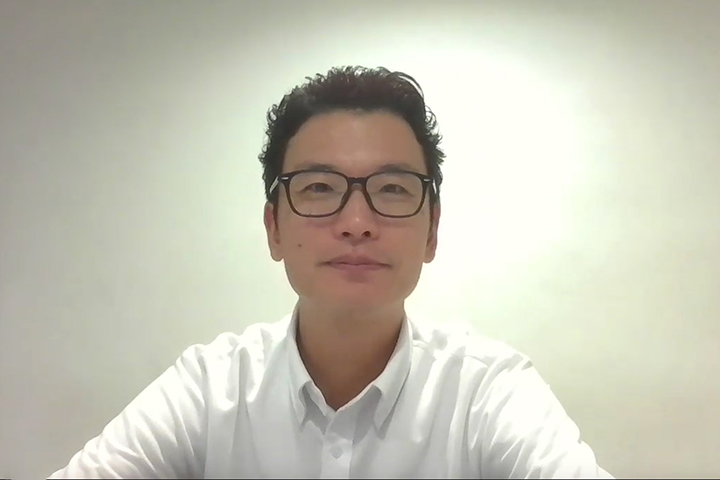
JICA expert Shimizu Takashi.
In order for the project’s system to actually be used, Shimizu thought it was necessary for society—starting with those involved in the project—to feel that many persons with disabilities would be capable of working if there were reasonable accommodations for them in workplaces. He first conducted a survey of local job seekers with disabilities, government officials, companies, and related organizations, to grasp the existing situation. Based on the results, he planned a program to build a collaborative structure between Social Service Officers (SSOs) and Human Resource Development Officers (HRDOs). A trial Linkage Creation Program was launched in the metropolitan area, and then the programs were updated for nationwide expansion by reviewing the results of the trial program. This program has been gradually expanded across the country.
The Linkage Creation Programs aim to strengthen the official cooperation between SSOs and HRDOs in order to connect persons with disabilities looking for work with companies willing to hire them. In order to develop a cooperative relationship, a series of workshops have been held for government officials, and some of them are now able to properly advise the job seekers and the companies seeking employees.
“We tell the participants that matching the strengths of each job seeker with the requirements of companies is key even if she or he has an impairment,” said Shimizu. “If there are actions that a person cannot carry out because of their disability, we suggest adjusting the work environment and work content so that people can fully demonstrate their potential, rather than forcing the person to overcome the obstacle.”
A training program was held in Japan in June 2023 for government officials and other project-related personnel from Sri Lanka. The program included visits to diverse workplaces where persons with disabilities work, in industries such as manufacturing, agriculture, and services. It also included interactions with organizations both of and for persons with disabilities.
An inspection team from Sri Lanka touring Nihon Rikagaku Industry Co., Ltd. in June 2023.
Shimizu thinks that the government officials have been inspired by the stories of workers with disabilities. They heard that the workers described working as a means of participating in society and living life their own way, rather than just as having a job. “Since returning back to Sri Lanka,” he said, “I have seen that the awareness of the need to improve services is growing through the exchange of opinions at the program participants’ regular meetings across ministries and departments, and through communication with persons with disabilities.
The number of successful employment cases has steadily increased, partly due to positive changes in the mindset of government officials. The project is currently at the halfway point (it is scheduled to end in November 2025), and in that time, 124 people have found employment at 105 companies in 18 districts.
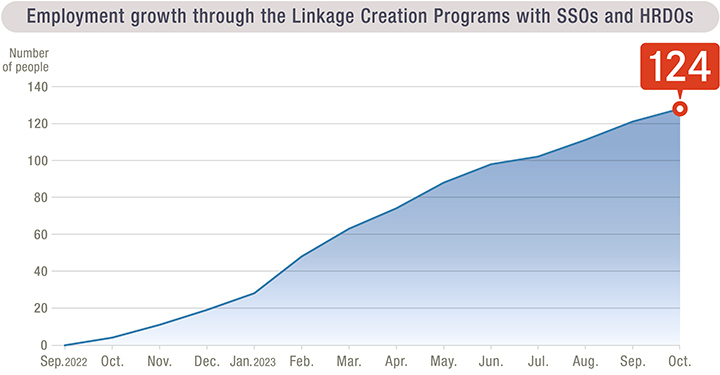
Many project participants speak highly of the effectiveness and results.
“Being a person with a hearing impairment, I used to think that society had left me behind, but now I feel that I am an important person with dignity who can contribute to society,” said Lakshani, who has been working at John Keells Logistics since December 2022.
“I have a disability in my legs. Now that my work has been recognized, I’ve been able to make more friends—co-workers who also have disabilities. I really enjoy working and want to continue as long as I can,” said Ajantha, an employee of Bees Bakery since February 2023.
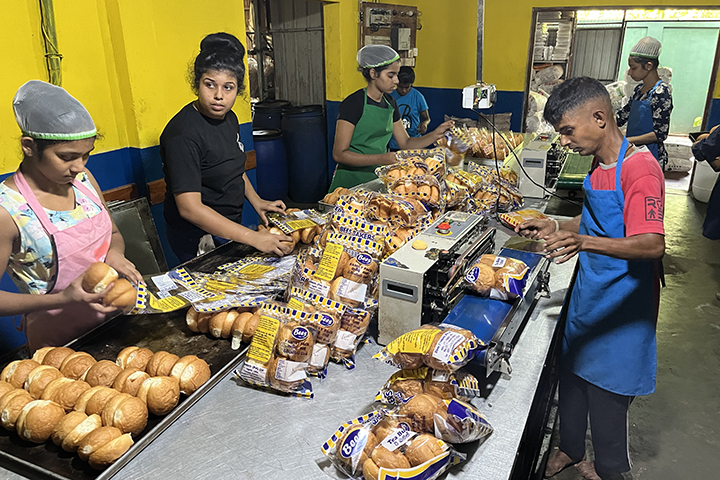
Ajantha (right, in the blue apron) is working at a bakery. The quality of his work led the company to ask HRDOs to introduce more job seekers with disabilities. As a result of the project, there are now three persons with disabilities working here.
The Easter bombings in Sri Lanka in 2019, and the spread of COVID-19 after that, led to an economic crisis and political instability. “In the first year of the project, we worried whether the project would actually be able to continue,” said Shimizu. “But thanks to the help of local stakeholders, we have been able to continue to see growth in successful employment cases. I think the process of supporting each case carefully with the help of local stakeholders is crucial for our project.”
Currently, however, the six-month retention rate of workers with disabilities remains at just under 60 percent. According to Shimizu, employees face a variety of difficult factors such as the lack of both the understanding of family members and transportation. “Government officials need to closely communicate with families and companies to figure out what can be done to help people settle into their workplaces,” he said.
The project has begun taking the first steps in creating a collaborative system between SSOs and HRDOs and connecting job seekers with disabilities with companies. Over the next two years of the second half of the project, JICA will implement job coach training programs for human-resource managers of private companies to support persons with disabilities in making a smooth transition to the workplace. The agency aims to change acceptance systems and improve the retention rate by improving the knowledge of HR managers in the private sector regarding the employment of persons with disabilities.
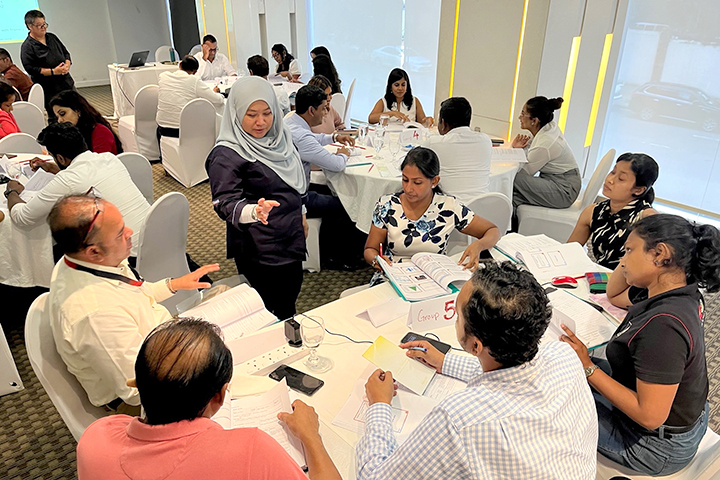
The first job coach training program was held for private HR managers in Colombo in September 2023.
Because there had been no mechanisms in place to give a voice to persons with disabilities and to reflect their needs in government services, Shimizu says that the project has launched community gatherings of workers and job seekers with disabilities in various areas. He also hopes that those groups will work to advocate for the rights of workers with disabilities and collaborate with government agencies and businesses to improve the services for them. “We hope that the people of Sri Lanka will gain confidence in their power to change their society for the better,” he said.
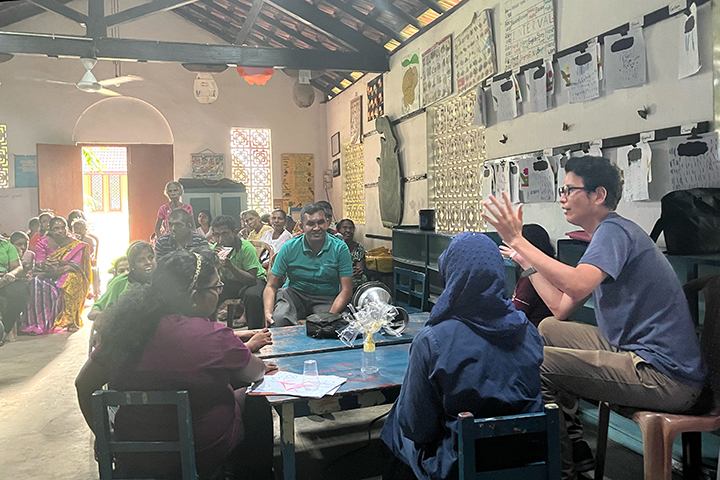
JICA’s Shimizu (right) in a meeting with persons with disabilities.
The United Nations Convention on the Rights of Persons with Disabilities includes the right for persons with disabilities to work, and they should get the appropriate support. The participation by those with disabilities as valuable workers in the labor market not only has positive effects for the individuals, but can change the mindsets of families, colleagues, companies, and local communities.
In Sri Lanka, JICA will continue working with government officials and persons with disabilities to support them to demonstrate their strengths and to contribute to society. The agency will continue its efforts to connect stakeholders with persons with disabilities and to promote their employment.
JICA is also working in other developing countries to promote respect for the rights of all persons with disabilities. It hopes to promote cooperation with the goal of full social participation and equality. There are a number of current projects in Asia and Central and South America, and the agency plans to expand these efforts to other regions such as Africa. JICA will continue to cooperate in disability mainstreaming in other fields, such as infrastructure construction, and in creating inclusive societies.
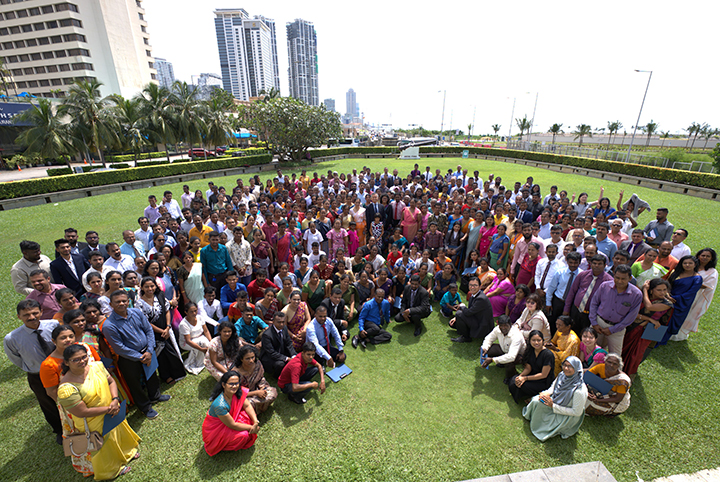
At an event held on November 19, 2023, in Colombo, awards were presented to persons with disabilities, SSOs, HRDOs, and companies based on successful employment cases. The event, the second of its kind, has been reported in the local media and contributed to raising public awareness of the employment of persons with disabilities. The photo shows the event's attendees, including government officials, persons with disabilities employed through the project, company representatives, job coach training graduates, officials of meetings for persons with disabilities, and project staff.
scroll